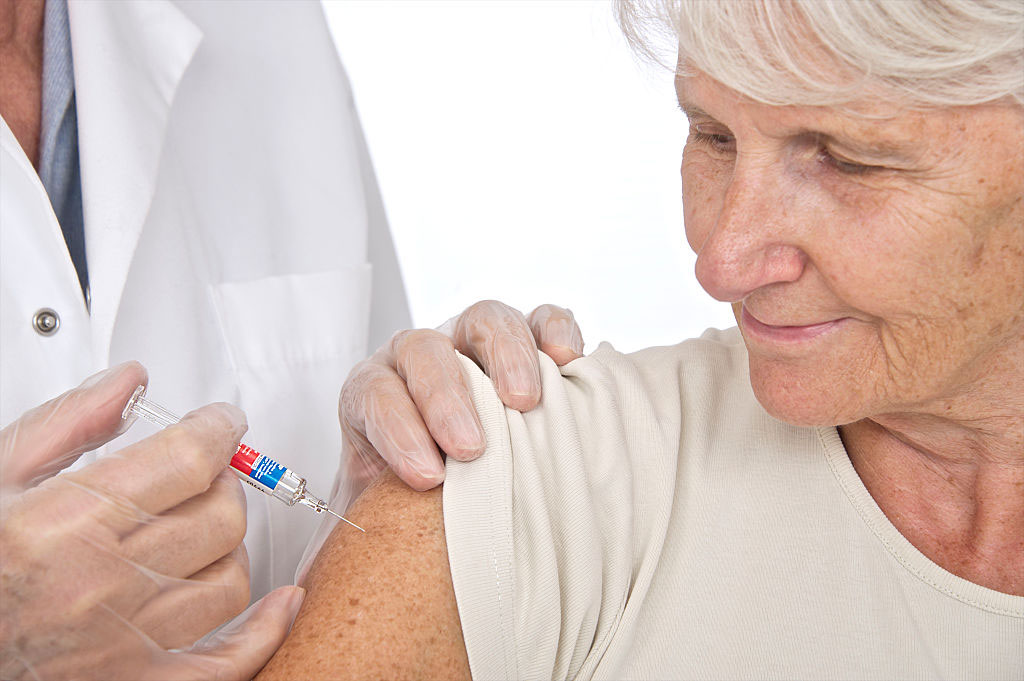Vaccines for Seniors

Many older adults don’t get the vaccinations they need.
There are certain vaccinations older adults need to stay healthy, and several more they may need depending on their health history.
Yet vaccine rates for older Americans are falling short. Three out of four older Americans don’t get the shingles vaccine, for example, despite the miseries that come with the disease.
The rates for older adults getting flu, pneumonia, tetanus, or shingles shots – the four most common vaccinations among the elderly – are behind national goals. That leaves millions of older adults at risk of dying or being hospitalized, reports PBS Newshour.
YOU MIGHT ALSO LIKE: How to Eat Healthy as You Age
Vaccines for seniors recommended include those for influenza (flu), shingles (herpes zoster), diphtheria, tetanus, pertussis (whooping cough), and pneumococcal disease (pneumonia).
Some seniors have medical conditions or lifestyles that put them at risk for certain other diseases. They may need vaccinations for hepatitis A, hepatitis B, MMR (measles, mumps or rubella), meningitis, and Hib (haemophilius influenzea type b).
“Several preventable diseases cause significant illness and even death in unvaccinated seniors. An estimated 45,000 adults die annually from complications due to vaccine-preventable diseases,” writes John Muir Health.
Many adults feel that they don't need vaccinations, or worry about side effects from the vaccine itself, but people age 65 and older are at higher risk of complications from the actual diseases. You can review the Centers for Disease Control and Prevention’s (CDC) Adult Immune Schedule to see what vaccinations you need.
“It is important for older adults to keep vaccines current: they may not have been vaccinated as a child, new vaccinations may now be available, immunity may have faded, and most importantly, seniors are more susceptible to serious and possibly life-threatening infections,” according to John Muir Health.
A vaccine stimulates your immune system to produce antibodies, as it would if you were exposed to the disease. But after vaccination, you develop immunity to the disease without having to endure the misery of it first. A vaccine is administered by injection, mouth, or aerosol. A vaccination of a killed or weakened organism produces the immunity in the body against that organism.
Immunization is the process by which a person is protected from a disease. The term is often used interchangeably with vaccination or inoculation.
Louise Abate, for example, a retired casino supervisor in Rio Rancho, NM, has had shingles three times. The last time hit her so hard that she still deals with lingering nerve pain that has lasted for years, Paula Span writes in The New York Times.
She had heard about a shingles vaccine, but “I really didn’t pay attention,” she says.
“Trying to prevent these common and often debilitating conditions is incredibly important for older adults,” says Carolyn Bridges, MD, associate director for adult immunization at the CDC. In the CDC’s 2014 and 2015 reports on vaccination coverage, however, she said, “we really didn’t see much change.”
Most Americans over age 65 get an annual flu shot, but even that statistic declined a few percentage points last season. The CDC estimates that of the 226,000 people hospitalized for flu in an average year, 50 to 70 percent are over 65. The great majority who die from it fall into that age category as well. “Older adults take the brunt,” Bridges said.
Public health officials say doctors need to recommend vaccines for seniors more often whenever they see a patient. “Primary care doctors think vaccines are important, but … it’s difficult for them to incorporate vaccination into giving routine care,” said Bridges. Many physicians that mainly treat adults don’t make vaccinations a priority, she said. But there are clear reasons they should.
Updated:
April 07, 2020
Reviewed By:
Janet O’Dell, RN